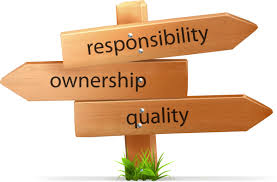
Ownership is more than just possessing something—it is about taking responsibility, being accountable, and committing to outcomes. Whether in personal life, business, or society, ownership is a quality that drives growth, productivity, and trust. Individuals and organizations that embrace ownership cultivate a culture of accountability, initiative, and excellence. This article explores the concept, importance, benefits, and strategies for fostering ownership in various aspects of life.
What is Ownership?
Ownership is the act of taking responsibility for tasks, decisions, and outcomes, regardless of whether one directly controls all the resources involved. It implies a mindset where individuals or organizations feel accountable for their actions, results, and impact. True ownership goes beyond legal possession—it includes ethical responsibility, initiative, and dedication.
In a corporate context, ownership often refers to employees treating organizational goals as their own, leading to higher engagement, innovation, and performance. In personal life, ownership reflects taking responsibility for one’s growth, finances, relationships, and decisions.
Why Ownership is Important
-
Promotes Accountability
Ownership ensures that individuals and teams take responsibility for their actions and results. When people feel a sense of ownership, they are more likely to follow through, meet deadlines, and deliver high-quality outcomes. -
Drives Initiative and Innovation
Those who take ownership are proactive—they identify problems, propose solutions, and act without waiting for external direction. This mindset fosters creativity, innovation, and continuous improvement. -
Enhances Trust and Credibility
Organizations and individuals who demonstrate ownership earn trust from colleagues, leaders, and clients. People value those who take responsibility and deliver results consistently. -
Boosts Personal Growth and Confidence
Ownership encourages self-reliance and learning from experiences. By accepting responsibility, individuals build confidence, resilience, and critical thinking skills that are essential for long-term success. -
Improves Organizational Performance
In businesses, a culture of ownership leads to higher employee engagement, efficiency, and accountability. Teams that embrace ownership are more motivated to achieve collective goals and solve challenges effectively.
Key Qualities of Ownership
-
Responsibility
Taking ownership starts with recognizing one’s responsibilities and committing to fulfilling them, regardless of obstacles or difficulties. -
Accountability
Ownership means acknowledging both successes and failures, learning from mistakes, and being transparent about outcomes. -
Proactivity
Owners do not wait for instructions—they anticipate challenges, take initiative, and act to improve processes or results. -
Commitment
Ownership requires dedication to achieving goals and following through on promises, even when facing adversity. -
Integrity
True ownership includes ethical decision-making and being honest about one’s actions, ensuring that outcomes are fair and responsible.
How to Foster Ownership
1. Personal Ownership
-
Set Clear Goals: Define personal and professional objectives to create a roadmap for accountability.
-
Track Progress: Monitor achievements and setbacks, learning from both successes and failures.
-
Take Responsibility for Mistakes: Accept errors as opportunities to improve rather than blame others.
-
Develop Self-Discipline: Build habits that support consistent effort and follow-through.
2. Organizational Ownership
-
Empower Employees: Provide teams with autonomy and decision-making authority to foster responsibility.
-
Recognize Accountability: Reward employees who demonstrate ownership and initiative.
-
Encourage Open Communication: Create a culture where employees can voice ideas and report problems without fear.
-
Set Clear Expectations: Ensure everyone understands their role, responsibilities, and goals within the organization.
3. Ownership in Society
-
Civic Responsibility: Citizens taking ownership of social issues, community welfare, and environmental protection.
-
Entrepreneurship: Business owners taking responsibility for their enterprise, employees, and impact on society.
-
Education: Students taking ownership of their learning through discipline, curiosity, and active participation.
Benefits of Ownership
-
Enhanced Productivity
Individuals and teams that embrace ownership are more motivated and efficient, leading to higher output and better results. -
Stronger Relationships
Ownership builds trust in personal and professional relationships, fostering collaboration and mutual respect. -
Problem-Solving Capability
Owners take initiative to address challenges, leading to creative solutions and improved decision-making. -
Personal Empowerment
Taking ownership empowers individuals to shape their future, develop skills, and achieve their goals independently. -
Organizational Growth
Companies with a culture of ownership enjoy higher employee engagement, reduced turnover, and increased profitability.
Examples of Ownership in Action
-
Entrepreneurial Ownership
Entrepreneurs who treat their business as their personal mission take ownership of both successes and failures. They invest in innovation, customer satisfaction, and long-term growth. -
Employee Ownership Mindset
Employees who act like owners of their projects or departments go beyond assigned tasks, seek improvements, and deliver results that exceed expectations. -
Community Ownership
Citizens who actively participate in community development, environmental initiatives, or social programs demonstrate ownership by contributing to collective well-being. -
Educational Ownership
Students who take ownership of their learning set goals, seek resources, and actively engage with lessons, resulting in higher academic performance and personal growth.
Challenges to Ownership
While ownership is highly beneficial, it faces certain challenges:
-
Fear of Failure: Some avoid ownership to escape responsibility for mistakes.
-
Lack of Resources: Without tools, authority, or knowledge, taking ownership can be difficult.
-
Resistance to Change: People may resist new responsibilities that require proactive behavior.
-
Limited Accountability Culture: In organizations or communities lacking accountability, ownership may not be encouraged or recognized.
Overcoming these challenges requires supportive environments, mentorship, empowerment, and continuous learning.
Conclusion
Ownership is a cornerstone of personal development, organizational success, and societal progress. By taking responsibility, being accountable, and committing to outcomes, individuals and organizations can achieve greater productivity, trust, and impact. Fostering ownership requires clear goals, empowerment, ethical behavior, and a proactive mindset.
In essence, ownership is more than control or possession—it is the willingness to take charge, act responsibly, and drive meaningful results. Embracing this quality can transform personal lives, workplaces, and communities, creating a culture of accountability, growth, and excellence.




You must be logged in to post a comment.